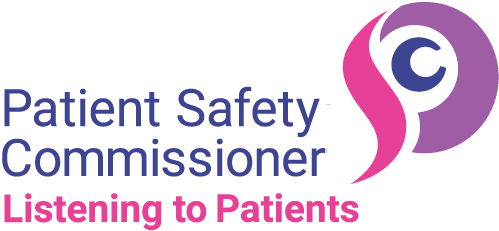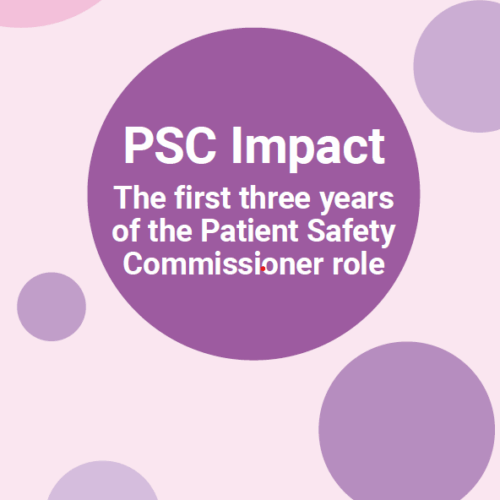Updates
Patient Safety Commissioner calls for urgent compensation for pelvic mesh and valproate patients
More than two years after the Hughes Report was published, the Government has yet to provide a clear timeline for implementing a compensation scheme for the thousands of patients harmed by pelvic mesh and valproate.
Professor Hughes has described the delay as unacceptable, given the severity and scale of harm involved, and has written directly to Number 10 seeking a timetable for action.
In a letter to the Prime Minister on 3 March, Professor Hughes said:
“Patients and families affected have experienced prolonged, avoidable harm to their physical and mental health as a result of systemic failures and a breakdown in informed consent.
“Whilst progress on non-financial aspects of redress is welcome, acknowledgement without action does not provide justice. Patients’ lives do not stand still while departments debate jurisdiction and process. The continued absence of a clear timetable for financial compensation compounds the harm already suffered.
“As the authority to deliver financial compensation rests with HM Treasury and Number 10, decisive leadership from the centre of Government is now essential. The Hughes Report recommended both interim and main financial redress schemes that are straightforward, non-adversarial, based on an assumption of truth, and administered by an independent body trusted by patients. These proposals provide a credible and compassionate route forward.
“I urge you to ensure that a clear timetable is set and that financial redress is delivered without further delay.”
Read the full letter here.
Patient Safety Commissioner to approach Number 10 directly over redress delays
Patient Safety Commissioner Professor Henrietta Hughes has today announced she will approach Number 10 directly to secure financial redress for those harmed by pelvic mesh and the medicine valproate, following a Government update that provides no timetable for decisions on financial compensation.
The announcement comes nearly two years after the publication of the Hughes Report in February 2024, which examined options for redress for patients and families affected by these interventions. The report followed earlier advice provided to the Department of Health and Social Care in October 2023.
Sodium valproate is a life-saving drug used in epilepsy and bipolar disorder, but when taken in pregnancy it harms the foetus. Pelvic mesh, used to treat stress urinary incontinence and pelvic organ prolapse, is estimated to have harmed 10,000 women.
Using statutory powers
In October 2025, to mark the second anniversary of the Ministerial advice, Professor Hughes wrote to Dr Zubir Ahmed MP, Parliamentary Under-Secretary of State for Health Innovation and Safety, using her powers under Schedule 1, paragraph 3 of the 2021 Medicines and Medical Devices Act. This legislation authorises the Patient Safety Commissioner to access information, documents or records considered necessary for the exercise of her functions. This was the first time these powers have been exercised.
Professor Hughes sought information about the steps that had been taken by Ministers and officials to respond to her report and its ten recommendations on redress.
No timetable for action
While welcoming progress on non-financial aspects of redress and Minister Ahmed’s personal commitment, Professor Hughes confirmed today that what is starkly absent from the Government’s update is any commitment to a timetable for action on financial redress.
The Department of Health and Social Care does not have the agency to deliver financial compensation. That authority sits with the Treasury and Number 10.
Professor Henrietta Hughes said:
“I welcome Minister Ahmed’s acknowledgement that financial redress is part of the Government’s thinking. However, acknowledgement alone does not provide justice to the thousands of patients and families who have been harmed.
“What is starkly absent from this update is any commitment to a timetable for action. Nearly two years after publishing my report, patients are still waiting for action and financial redress. Patients’ lives don’t grind to a halt while Government departments debate jurisdiction and timelines.
“I am grateful for the Minister’s personal commitment and the progress on non-financial aspects. But the reality remains that the Department of Health and Social Care does not have the agency to deliver financial compensation. That authority sits with the Treasury and Number 10.
“I will now be approaching Number 10 directly, using the power to request information under the 2021 Medicines and Medical Devices Act if required. This is very much unfinished business and I will not stop holding Government to account until this is resolved for the patients and families harmed.”
Background
The Hughes Report made 10 recommendations including interim and main financial redress schemes, with applications to be straightforward, non-adversarial and based on an assumption of truth. The report called for schemes to be administered by an independent body which commands the confidence of patients.
These families have suffered life-long avoidable harm caused by systemic failures and a betrayal of trust driven by a failure of informed consent. The time taken to respond to the report has been unquestionably unacceptable as time does not stand still for patients and families who have been harmed.
Read the government responses to the Patient Safety Commissioner:
Responding to the National Voices report
Responding to the publication of the Department of Health and Social Care (DHSC) and National Voices report – ‘Patient views on medical devices prescribed to them outside of hospital in England’ Patient Safety Commissioner Professor Henrietta Hughes said:
“Hearing the patient voice is paramount if we are to make important progress in the way we prescribe medical devices and ensure the highest standards of safety. Patients’ lived experiences and views are vital for identifying how care can be improved and harm avoided.
“I welcome the report, which provides valuable insights and recommendations to improve patient experience of the 60,000 devices in Part IX of the NHS Drug Tariff. The report highlights the features patients value most, helping DHSC shape future device assessment and categorisation.
“The report describes both positive and negative patient experience of medical devices across a range of health specialties – each of them important areas to address.
“The report also reinforces the Patient Safety Principles and key themes which I have long championed – that patients want and expect medical devices to help them live their lives to the fullest without harm. It also rightly stresses the important of patient choice and that ‘one size doesn’t fit all’. I look forward to seeing the recommendations adopted nationally and by commissioners in integrated care systems across the country.”
You can view the full report here: https://www.nationalvoices.org.uk/publication/patient-views-on-medical-devices-prescribed-to-them-outside-of-hospital-in-england/
Patient Safety Commissioner publishes letter to Minister Ahmed
On Friday 31 October 2025, marking the second anniversary of the Ministerial Advice to the DHSC, I wrote to Minister Ahmed formally to exercise the powers under the Medicines and Medical Devices Act 2021 (Sch 1, para 3), to request information for the purposes of carrying out my core duties. I have requested a clear timeline of work and steps undertaken by DHSC over the last 2 years to consider the content of my report and recommendations on redress.
Read the letter here.
PSC and MHRA welcome Dash review of patient safety organisations
Following the publication of the government’s 10 Year Plan on the 3rd of July 2025, which confirmed that the hosting of the Patient Safety Commissioner will be transitioning from the Department of Health and Social Care to the Medicines and Healthcare products Regulatory Agency (MHRA), Patient Safety Commissioner Professor Henrietta Hughes and MHRA Chief Executive Lawrence Tallon have made the following statements.
Patient Safety Commissioner welcomes 10 Year Health Plan
I welcome the 10-Year Health Plan, specifically the focus on patient voice, transparency and accountability. Working in partnership with patients and listening to what they say leads to more improvement and less harm. I look forward to supporting patients and the healthcare system to make this a reality for all.
PSC Annual Report laid before Parliament
My annual report for 2024-25 has been laid before Parliament.
It highlights the policy work and activities over the year.
It is available on my website here
RNID and SignHealth publish report on accessibility of healthcare for people with hearing loss
The RNID and SignHealth have published a report on accessible healthcare for people who are deaf or have hearing loss. The report shows that the NHS does not have the systems in place to fulfil the right to accessible healthcare for people who are deaf or have hearing loss, and the NHS often fails to meet their fundamental needs, clearly violating the rights set out in the Equality Act over 15 years ago.
The report covers how:
- NHS services are regularly failing to implement the five steps of the AIS.
- NHS Services do not meet the specific needs of those who require communication support.
- NHS systems fail to equip staff to meet the needs of patients.
- There is a lack of deaf awareness amongst NHS staff, and a need for training to improve it.
- Complaints processes are often inaccessible and rarely lead to improvements.
The report also gives recommendations for the DHSC and NHSE on improvements for accessibility.
Find the report here: https://rnid.org.uk/2025/04/hidden-nhs-scandal-putting-millions-of-lives-at-risk/
HSSIB report highlights challenges to managing safety systems
The Health Services Safety Investigations Body (HSSIB) has published a new report, Safety Management: Accountability Across Organisational Boundaries, highlighting significant challenges in managing patient safety risks across multiple healthcare providers. This report highlights that there exist no overarching safety management principles to ensure a consistent collaborative report across healthcare providers and ICBs.
The investigation examines how safety is managed when care transitions between providers, particularly within Integrated Care Systems (ICSs). It reveals inconsistencies in how patient safety risks are identified, escalated, and managed—often leading to delays in care, confusion over responsibility, and undue burdens on healthcare professionals and organisations.
The findings of the report include:
- A misalignment between national expectations and ICBs’ ability to manage patient safety risks effectively, due to resource constraints and data usability challenges.
- Variability in how patient safety risks are escalated at regional and national levels, with limited feedback mechanisms in place.
- A lack of integrated patient safety data, making it difficult for ICBs to proactively identify risks spanning multiple providers.
Key Recommendations
HSSIB has made a safety recommendation to the Department of Health and Social Care and NHS England to use the findings of this report to shape the upcoming 10-Year Health Plan and NHS Quality Strategy. This includes embedding safety management principles into healthcare to improve cross-organisational patient safety.
Additionally, safety learning points have been highlighted for Integrated Care Boards (ICBs), urging them to:
- Ensure collaborative working across health and care providers when commissioning services to improve patient safety.
- Develop greater expertise in analysing safety data and intelligence to identify and address risks across multiple providers.
The Patient Safety Commissioner welcomes this report and encourages policymakers, NHS leaders, and healthcare professionals to engage with its findings to help shape a safer, more transparent, and patient-centred healthcare system.
For the full report and recommendations, visit https://www.hssib.org.uk/patient-safety-investigations/safety-management/investigation-report/
New analysis reveals reduction in valproate prescribing
Prescribing of valproate has reduced significantly following the introduction of a quality improvement programme that promotes safety and patient choice.
New analysis presented to the National Patient Safety Committee shows:
- a 53% reduction in initiation in girls aged 0-12
- a 60% reduction in 13-54 women started on valproate
- a 65% reduction in women re-starting valproate after a break of 6 months
- at least 9 out of 17 mothers have active management of valproate if it was prescribed during pregnancy
- and hospital admissions for women with epilepsy aged 13-54 have not been affected by these changes.
The quality improvement programme follows a recommendation by the PSC in 2023 which was accepted by NHSE in January.
Review finds safety recommendations system ‘untenable’
The current situation on recommendations for safety and quality in healthcare is untenable according to a new review.
The DHSC-commissioned review was published by HSSIB on behalf of a group of ALBs. It concludes that the substantial number of recommendations made to the healthcare system means providers struggle to prioritise and implement recommendations.
It found that the lack of structure around the creation and implementation of recommendations as well as the lack of monitoring of actions means many are not improving patient care while continuing to burden providers.
Some recommendations duplicate or contradict others and most are not costed, which may affect providers’ ability to implement them and means there is a lack of information to support prioritisation decisions. Some may be of limited relevance to certain providers and could promote inequalities by negatively impacting certain patient groups if implemented. There is a lack of monitoring of the actions planned or taken to address recommendations.
Welcoming the report, the PSC said: ‘It is becoming increasingly clear to the public that vital recommendations for urgent changes to be made to keep the public safe are simply not being acted upon, leaving persistent risks unaddressed and patients and staff vulnerable.
‘It is essential that the public can have the confidence that recommendations commissioned from independent safety bodies, reviews and Inquiries are properly co-ordinated and followed up with tangible actions. Patients deserve a healthcare system where safety is a top priority, where lessons are learned, and avoidable harms are removed. It is unacceptable that findings which could prevent harm or injury can be neglected for decades.’
The review recommends further work to look at setting up a repository for recommendations, a monitoring system and a route of escalation for recommendations that are not implemented.
PSC welcomes new guidance on valproate usage by men
Men taking valproate and their partners are being advised to use effective contraception according to new guidance from the MHRA. It recommends that male patients and their partners use effective contraception during valproate treatment and for at least three months after stopping the medication.
 It follows a study which reports a possible association between valproate use by men and a small increased risk of a range of neurodevelopmental disorders in their children when compared to men prescribed other medicines for the same conditions (lamotrigine or levetiracetam).
It follows a study which reports a possible association between valproate use by men and a small increased risk of a range of neurodevelopmental disorders in their children when compared to men prescribed other medicines for the same conditions (lamotrigine or levetiracetam).
Though the risk is much lower than the risk of neurodevelopmental disorders in children born to mothers who take valproate during pregnancy, and the MHRA has long advised against the use of valproate by women able to have children unless there is a Pregnancy Prevention Programme (PPP) in place, this new advice acknowledges that valproate use in fathers is also associated with risk to children as well.
The full guidance can be found here
New summary of key patient safety surveys
The 2024 edition of Patient Experience in England is now available from Care Opinion.
As well as summarising the key findings from last year’s large scale patient surveys, the report looks at wider research covering issues such as equity and accessibility as well as studies on patient voice and safety. It is available at Patient Experience Library
NHS England launches new primary care patient safety strategy
NHS England has released a new primary care patient safety strategy. Although the National Patient Strategy pertains to all sectors, this new strategy provides specific focus on primary care and sets out national and local commitments. View it at NHS England » The NHS Patient Safety Strategy
The latest blog from the PSC:

Patient Safety Commissioner calls for urgent compensation for pelvic mesh and valproate patients
More than two years after the Hughes Report was published, the Government has yet to provide a clear timeline for implementing a compensation scheme for the thousands of patients harmed by pelvic mesh and valproate. Professor Hughes has described the delay as unacceptable, given the severity and scale of harm involved, and has written directly […]
The latest guest blog:
Patient Safety Commissioner calls for urgent compensation for pelvic mesh and valproate patients
More than two years after the Hughes Report was published, the Government has yet to provide a clear timeline for implementing a compensation scheme for the thousands of patients harmed by pelvic mesh and valproate. Professor Hughes has described the delay as unacceptable, given the severity and scale of harm involved, and has written directly […]
The latest blog from the PSC

Patient Safety Commissioner calls for urgent compensation for pelvic mesh and valproate patients
More than two years after the Hughes Report was published, the Government has yet to provide a clear timeline for implementing a compensation scheme for the thousands of patients harmed by pelvic mesh and valproate. Professor Hughes has described the delay as unacceptable, given the severity and scale of harm involved, and has written directly […]
Implementing Martha’s Rule

As Martha’s Rule is introduced into the health system, colleagues who have pioneered the initiative in the UK and globally outline their experience in a series of blogs.
Demos head Polly Curtis, a member of the Martha’s Rule oversight group, outlines her involvement in the group.
I am the chief executive of Demos, a cross-party think tank that works to put people at the heart of policy making to improve how policy is developed as well as trust in politics. Think tanks sit outside government and are hives of ideas of how to improve the country, so it is…

Click here to report any side effects from a medicine or medical device

